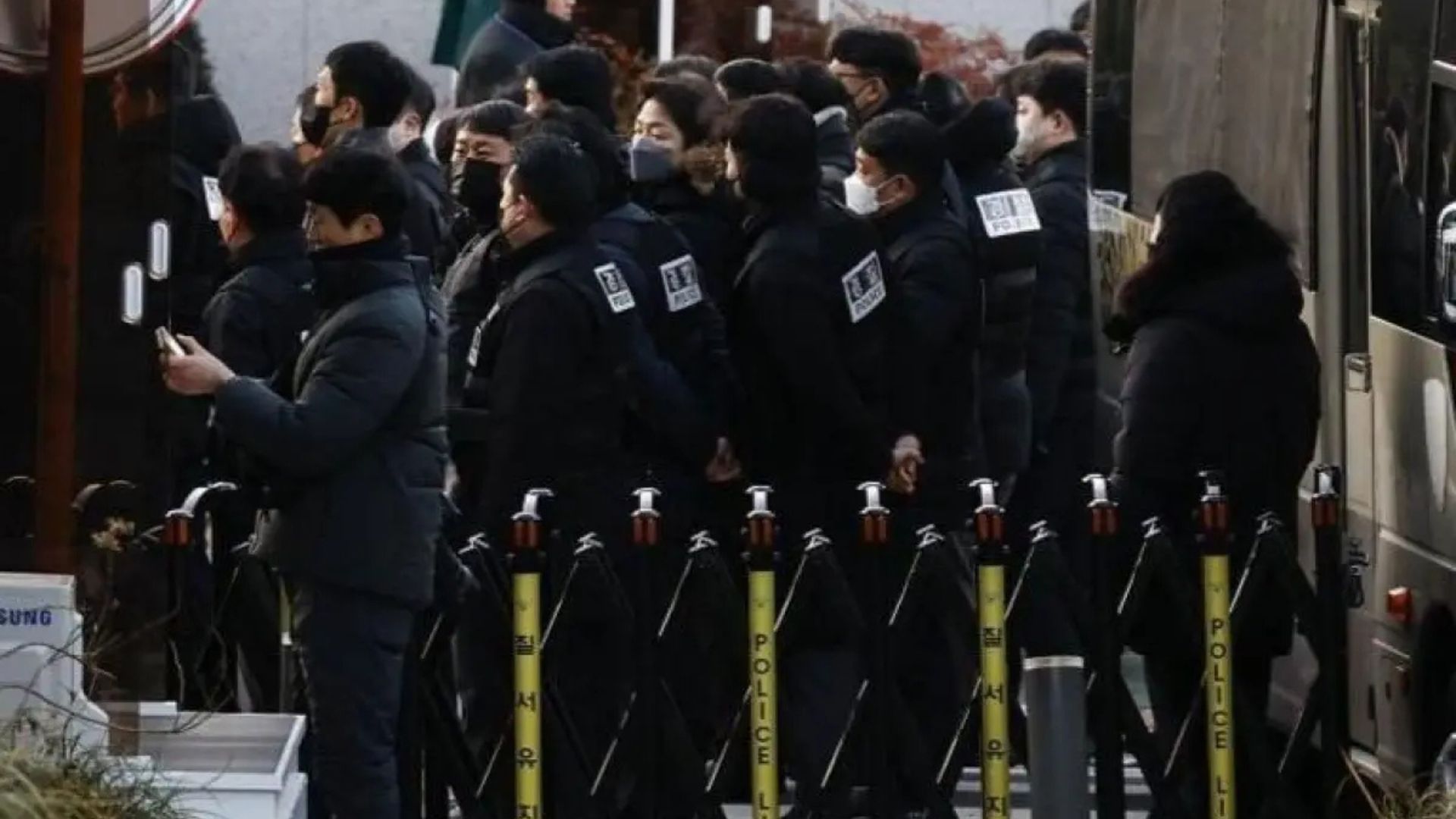(Reuters): A tense confrontation began Friday after South Korean President Yoon Suk Yeol, who is being investigated for insurgency, rejected an effort to arrest him at his home. At Yoon's complex in central Seoul, military personnel and presidential guards resisted police attempts to arrest them during a dramatic six-hour standoff over an attempted martial law on December 3.
Following Yoon's declaration of martial law, which provoked political unrest and prompted the investigation of insurrection charges, the Corruption Investigation Office for High-ranking Officials (CIO) revealed that it had issued the arrest warrant. However, when the situation grew more uncontrollable, the CIO officials said the operation had to be canceled. "It was determined that it was essentially impossible to carry out the arrest warrant due to the current standoff," the Chief Information Officer stated.
In order to show their resolve to prevent the arrest, hundreds of Yoon's supporters gathered close to the compound prior to the attempt. Their chants included "President Yoon Suk Yeol is going to be protected by the people" and calls for the CIO head's arrest. The investigating team, which included police and CIO officials, continued on their way to Yoon's home in spite of these objections.
Around seven in the morning, the team reached the compound's gates and entered. But as soon as they entered the premises, they ran into fierce opposition. In order to properly barricade the investigators, the military and the Presidential Security Service (PSS), which is responsible for protecting the president, swiftly organized to erect human chains around them.
Approximately 200 PSS and military personnel were reported to have layered themselves to thwart any government advances. There were no guns seen during the six-hour standoff, despite reports that several PSS operatives were armed. Yoon was nowhere to be found throughout this period, and authorities kept his whereabouts a secret. The PSS was verified by the Ministry of National Defense to be in charge of the military forces engaged in the standoff.
Concerned about the safety of its staff, the CIO decided to halt the arrest effort at 1:30 p.m. as the standoff continued. They apologized for Yoon's disregard for the law and made suggestions about potential next actions. The CIO stated, "We sincerely regret Yoon's attitude of non-compliance."

The charges of insurrection, which result from Yoon's brief and contentious declaration of martial law, are the main focus of the investigation. For the first time in South Korea's history, an arrest warrant for such accusations was issued to a sitting president. However, Yoon's legal team swiftly released a statement contesting the validity of the arrest attempts, claiming that the CIO had the jurisdiction to look into insurrection. "Illegal and invalid," they said, referring to the arrest attempt that took place in a sensitive security sector.
People Power, Yoon's party, also voiced support for delaying the arrest operation. The acting leader of the party applauded the decision and demanded that the investigation go on without the president being arrested. Police are still conducting their investigation into the obstruction allegations as part of the joint probe, and they have summoned the PSS head and his deputy for questioning.
After the president ignored multiple summonses, an arrest warrant was issued for Yoon. The investigative team will have to determine whether to hold him after the arrest, although the warrant is good until January 6. Yoon's legal team has voiced worries about how the inquiry is being handled and cautioned that any detention could result in more legal issues.
The conditions leading up to the declaration of martial law have continued to cause political instability in South Korea. Yoon's imposition of martial law shocked the nation, particularly because it was announced late on December 3, 2024. He declared martial law in an attempt to break the deadlock in politics and to stop what he called "anti-state forces." However, it immediately drew criticism.
Within hours of the announcement, 190 parliamentarians in South Korea voted against Yoon's proclamation, demonstrating the legislature's prompt action. In the morning, Yoon lifted martial law, although he later justified his move by saying that his political rivals at home were showing support for North Korea and making unsubstantiated claims of election manipulation.
Following the martial law occurrence, there have been political and legal fallout. The army chief and other South Korean military personnel who participated in the imposition of martial law have been charged with insurrection. Some officials have already been arrested as part of a larger probe into Yoon's behavior.
In addition, former Defense Minister Kim Yong-hyun, who played a significant role in the suspension of martial law, resigned and has subsequently been charged with mutiny and power abuse. The case against Yoon is not only a criminal investigation; it is part of a wider investigation. His impeachment case is also pending before the Constitutional Court, whose ruling will decide whether he is removed permanently or reinstated.
To consider the impeachment issue, the Constitutional Court held a hearing on Friday. Oral arguments regarding Yoon's position will be heard by the court at a second hearing on January 14. Yoon's legal team has made it clear that he may not be present for the initial arguments, but he is anticipated to defend himself at subsequent hearings.
Since Yoon is still under intense public and judicial scrutiny, the impeachment and criminal investigations have created a dangerous political environment in South Korea. The conclusion of these processes will have a significant effect on the country's governance as the constitutional court decides Yoon's future as president and judicial authorities continue to bring accusations against him for his activities during martial law.
Intense disagreements over the legitimacy of the investigation and Yoon's accusations accompany the legal issues, severely dividing South Korea's political scene. Others view these actions as a necessary reaction to his controversial declaration of martial law, while others argue that they are a politically motivated attempt to overthrow his presidency.





























